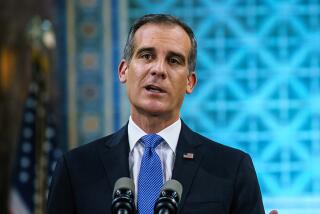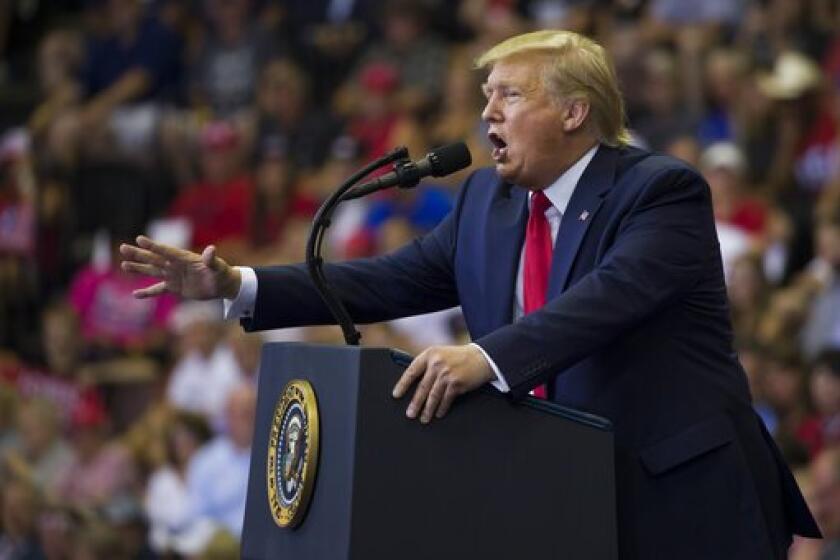There’s talk of Blair as a Mideast envoy
- Share via
WASHINGTON — Seeking to take advantage of British Prime Minister Tony Blair’s experience in the Middle East, the Bush administration has raised the possibility of his becoming a special envoy to the region after he leaves office next week.
State Department spokesman Sean McCormack said Wednesday that the administration saw a need to find one person who could step in and represent the four parties at the center of outside efforts in the Middle East: the United States, Russia, the European Union and the United Nations -- the so-called quartet.
The prime minister, McCormack said, “is passionate about the issues of the Middle East and ... has played a very constructive role in the international system on these issues -- a clear leader within the international system of very high standing.”
David Welch, assistant secretary of State for Near Eastern affairs, has been in London for meetings with British officials, McCormack said.
A Downing Street press officer early today declined to comment on the Washington reports.
“Basically, we’re not going to comment on the prime minister after he leaves. There’s a lot of speculation around,” she said.
White House officials played down reports that the administration was pressuring Blair, saying such accounts were “way ahead of any facts.”
“Right now, Tony Blair is prime minister,” White House Press Secretary Tony Snow said Wednesday. “At this particular point, we’re not in the business of designating envoys.”
Snow’s deputy, Dana Perino, earlier said, “Obviously, Prime Minister Blair has been very active and deeply involved in Middle East peace issues throughout his prime ministership.”
Blair and President Bush speak often, she said. “It would not surprise me if they have talked about what Prime Minister Blair would like to do following ... the end of his term, which is next Wednesday, but we don’t have anything to announce today.”
The position for which Blair is being mentioned had been held by James Wolfensohn, the former president of the World Bank. He stepped down in April 2006.
Blair, closing out his decade in office, has conducted numerous meetings and other conversations with world leaders, paying a farewell visit to Bush last month and speaking this month with Ehud Olmert, the Israeli prime minister.
Olmert and Blair discussed in a phone call the need to advance peace efforts between Israel and the Palestinians and the possible means to do so. Olmert said Blair had shown himself to be a true friend of Israel and invited him to visit the country again.
On Wednesday, Blair’s spokesman said the prime minister “discusses the Middle East with representatives in various countries over virtually any issue you may mention.”
“But I’m not going to get into what he may do after he has been prime minister, because that’s not my job.”
The BBC, citing sources in Washington, reported that while an appointment is “not a foregone conclusion,” Blair was said to have support from major players such as Israel.
“It looks like this is going to be Tony Blair’s next job, and it looks like Tony Blair wants this job,” the network reported.
A Middle East envoy position would be a natural fit for Blair, who has sought to use whatever leverage he has with the Bush administration in the Iraq war to push for a comprehensive solution to the various conflicts in the region.
In his last months in office, Blair has launched a renewed push to spark a settlement in the Middle East, an issue he said he planned to give as high a priority as the successful peace deal he brokered in Northern Ireland.
In an overheard conversation with Bush during a Group of 8 leading industrialized nations summit in Russia in 2006, Blair offered to travel to the region ahead of Secretary of State Condoleezza Rice in hope of building momentum for a settlement without political cost to the U.S.
“If she needs the ground prepared as it were ... because obviously if she goes out she’s got to succeed, as it were, whereas I can go out and just talk.”
Blair traveled to the region in December, visiting nine cities in seven days on a diplomatic mission that included a failed effort to help bring about the creation of a national unity government for the Palestinians.
Several months later such an accord was brokered with Saudi Arabia’s aid, but it collapsed amid renewed factional fighting. With the latest violence in the region splitting control over the Gaza Strip and West Bank between two Palestinian factions, the militant Islamic group Hamas and the more secular Fatah, members of the quartet face new challenges in attempting to stabilize the region.
However, Blair’s standing in much of the Arab world has been undermined not only by British participation in the invasion of Iraq, but also by his and Bush’s refusal to call for an immediate cease-fire in Lebanon last summer when the Israeli military battled Hezbollah militants there.
Blair has not discussed publicly his plans for after his departure as prime minister, though it is widely believed he is not likely to remain a backbencher in Parliament for long.
Blair is said to be planning to use a foundation now being created as a springboard for pursuing issues that have dominated his interest while prime minister, including the Middle East peace process, climate change and poverty relief in Africa.
The Observer newspaper reported that Blair has talked with actor Kevin Spacey about appearing in a London stage production of Arthur Miller’s “The Crucible” in the fall.
--
kim.murphy@latimes.com
Gerstenzang reported from Washington and Murphy from London. Staff writer Richard Boudreaux and special correspondent Batsheva Sobelman in Jerusalem also contributed to this report.
More to Read
Get the L.A. Times Politics newsletter
Deeply reported insights into legislation, politics and policy from Sacramento, Washington and beyond. In your inbox twice per week.
You may occasionally receive promotional content from the Los Angeles Times.










